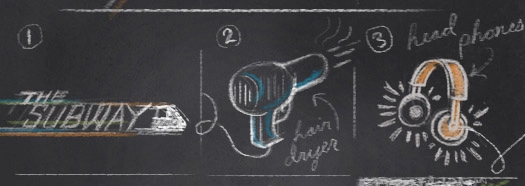
Here’s what you need to know about noise induced hearing loss or NIHL:
The Three Causes of NIHL that Everyone Should Know*
- Intensity of Sound
The louder the volume, the more likely the sound will damage your hearing. - Pitch
Combined with volume, the higher the pitch, the more likely your hearing will suffer. - Duration
The longer you’re exposed to loud noises, the more damaging.
Five Surprising Yet Common Situations that Can Contribute to NIHL*
- Attending Sporting Events
- Mowing the Lawn
- Listening to Headphones
- Using a Hair Dryer
- Riding the Subway
*Listed sound sources typically exceed 85 decibels. Unprotected exposure to sounds over 85 decibels for prolonged periods of time can lead to hearing damage.
Top Signs You’ve Just Been Exposed to Hazardous Noise Levels*
- You can’t hear someone talking three feet away
- You have a feeling of “fullness” in your ears
- You hear ringing or buzzing in your ears
- You can hear people talking but have difficulty understanding them
*Source: Better Hearing Institute.
Three Simple Steps to Prevent NIHL*
- Understand what noises (over 85 decibels) cause damage
- Avoid loud noise whenever possible
- Protect with earplugs or earmuffs when you can’t avoid those noises
*Source: National Institute on Deafness and Other Communication Disorders (NIDCD).
7 Questions to Help Determine if You Have NIHL*
- Do you often misunderstand what is said?
- Do you often ask to have things repeated?
- Do you have difficulty following verbal instructions?
- Do you often turn up the volume on the TV, radio, or stereo?
- Do you have difficulty listening or paying attention in environments with lots of background noise?
- Do you have trouble identifying and/or localizing sounds?
- Do conversations make you feel isolated, excluded, annoyed, confused, or embarrassed?
*Source: American Speech-Language-Hearing Association.
So What Can You Do if You Have NIHL?
- Prevent further damage by following the steps above
- Make family, friends and colleagues aware of your difficulties
- Get your hearing tested by a hearing health care provider
- When recommended by your provider, get fitted for and wear hearing aids
5 Negative Effects of Untreated NIHL
- Mental Health
Brain shrinkage, dementia, Alzheimer’s, memory loss, and depression can result from untreated NIHL. - Career and Employment
Left untreated, NIHL can lead to fewer job and advancement opportunities, decreases in job performance, job loss, and reduced earning power. - Social
Feelings of isolation, raised levels of anxiety and irritability, and strained family relationships are all tied to untreated NIHL. - Hearing
In addition to the possibility of additional hearing loss, permanent ringing in the ears (known as tinnitus) may also result. - Day to Day
Quite simply, untreated NIHL means you’ll miss out on some of the sweetest sounds of life, like music, birds, small children, and so much more.
Top Spots to Learn More

